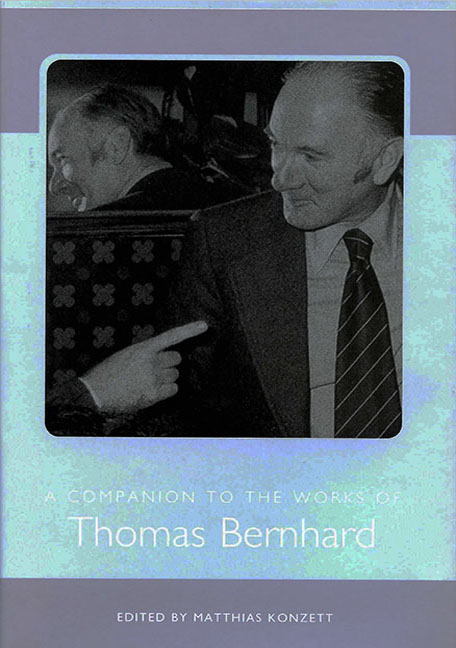Book contents
- Frontmatter
- Contents
- Acknowledgments
- Abbreviations
- Bernhard in the Public
- Bernhard's Poetics
- Homeland, Death, and Otherness in Thomas Bernhard's Early Lyrical Works
- The Broken Window Handle: Thomas Bernhard's Notion of Weltbezug
- Thomas Bernhard's Poetics of Comedy
- Bernhard and Drama
- Bernhard's Social Worlds
- Works Cited
- Notes on the Contributors
- Index
Thomas Bernhard's Poetics of Comedy
from Bernhard's Poetics
Published online by Cambridge University Press: 28 April 2017
- Frontmatter
- Contents
- Acknowledgments
- Abbreviations
- Bernhard in the Public
- Bernhard's Poetics
- Homeland, Death, and Otherness in Thomas Bernhard's Early Lyrical Works
- The Broken Window Handle: Thomas Bernhard's Notion of Weltbezug
- Thomas Bernhard's Poetics of Comedy
- Bernhard and Drama
- Bernhard's Social Worlds
- Works Cited
- Notes on the Contributors
- Index
Summary
All of Bernhard’s characters have to make decisions. The more they ponder the possible alternatives, which are mutually exclusive, the more insecure they become. The more the alternatives are being weighed, the more the opposite choices begin to resemble one another. A decision made is tantamount to a decision made in favor of misfortune. We, as outsiders, are not privy to this moment of decision. Because the alternatives cannot be reconciled, they risk becoming irrelevant. Bernhard once remarked in an interview that he talks about death in the same manner he talks about a roll of bread. In the play Der Theatermacher the hero is continuously faced with the choice between Liver Dumpling Soup (Leberknödelsuppe) and Fried Crêpe Soup (Fritatensuppe). We are not too far off the mark when we assume that in this cosmos with its pervasive sense of Bernhard's poetics of comedy, the choice between Liver Dumpling Soup and Fried Crêpe Soup could assume the same validity as that between life and death.
The similarity of opposites turns into a line of argument used in a manner worthy of scholastics and at the same time facilitates a form of writing that no longer emphatically insists on truth. By circumventing the truth through a lie, one even claims to recognize the truth:
Die Wahrheit, die wir kennen, ist logisch die Lüge, die, indem wir um sie nicht herumkommen, die Wahrheit ist. Was hier beschrieben ist, ist die Wahrheit und doch nicht die Wahrheit, weil es nicht die Wahrheit sein kann.
“Wahrscheinliches, Unwahrscheinliches” (The Likely and the Unlikely) was the original title given to the collection of short prose published under the title Der Stimmenimitator. Here we read that Stanislaw Jerzy Lec always told the truth and of his absurd claim that the most dangerous enemies of the Polish regime had been buried under the Nowy Swiat in Warsaw. By taking a lie close to the border of truth — and I phrase this in a cautious manner — Bernhard opens up a new dimension within truth. The choice between truth and untruth, he suggests, may well be decided in the same egalitarian manner as other alternatives, such as the choice between two soup dishes.
- Type
- Chapter
- Information
- A Companion to the Works of Thomas Bernhard , pp. 105 - 116Publisher: Boydell & BrewerPrint publication year: 2002

